2023届高考英语二轮复习:虚拟语气课件(46张ppt)
文档属性
| 名称 | 2023届高考英语二轮复习:虚拟语气课件(46张ppt) |
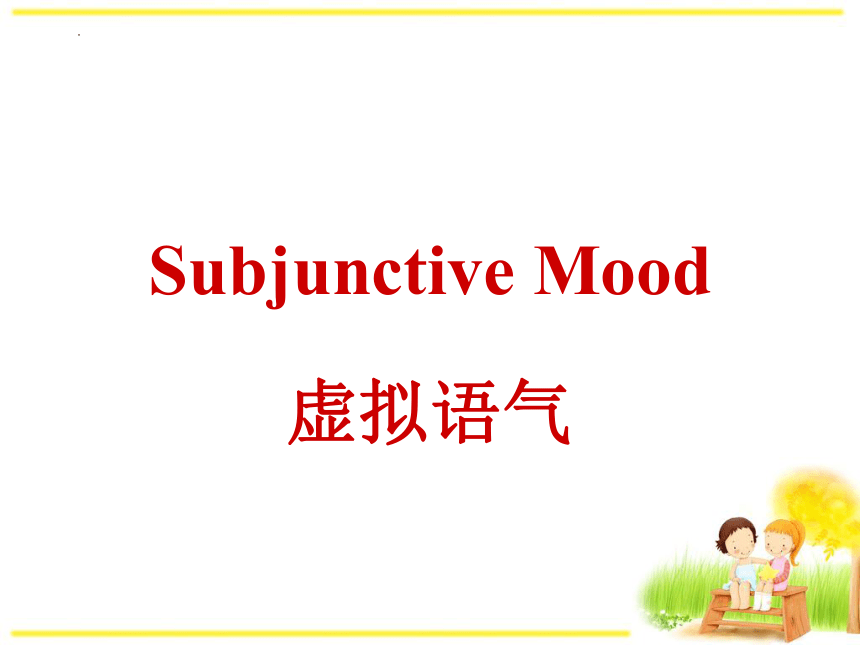
|
|
| 格式 | pptx | ||
| 文件大小 | 211.8KB | ||
| 资源类型 | 教案 | ||
| 版本资源 | 通用版 | ||
| 科目 | 英语 | ||
| 更新时间 | 2023-01-13 00:00:00 | ||
图片预览

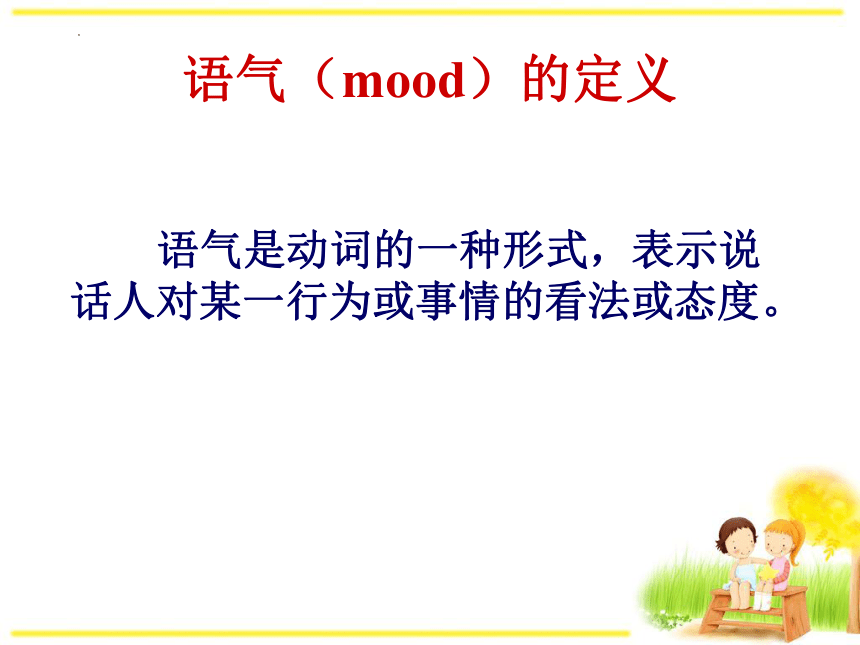
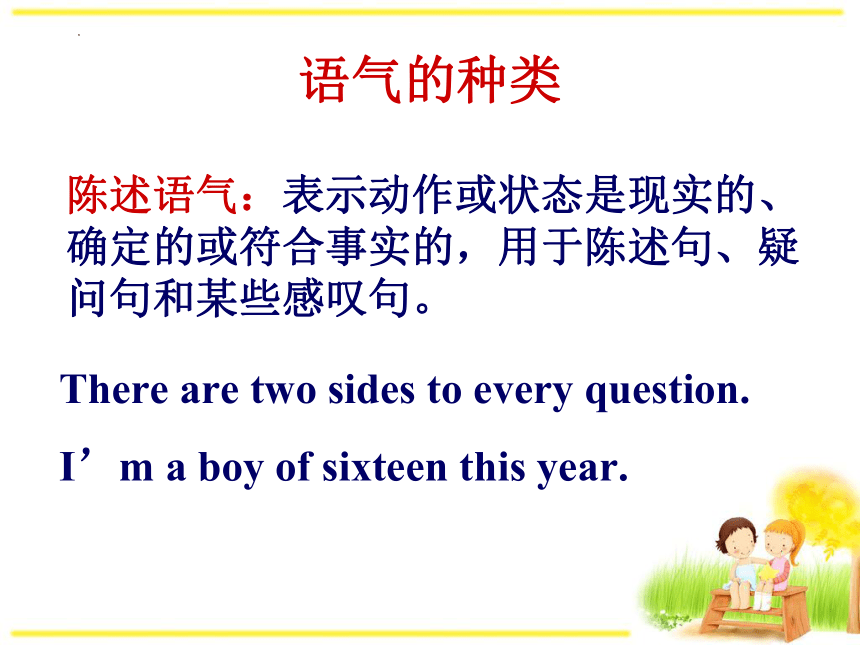
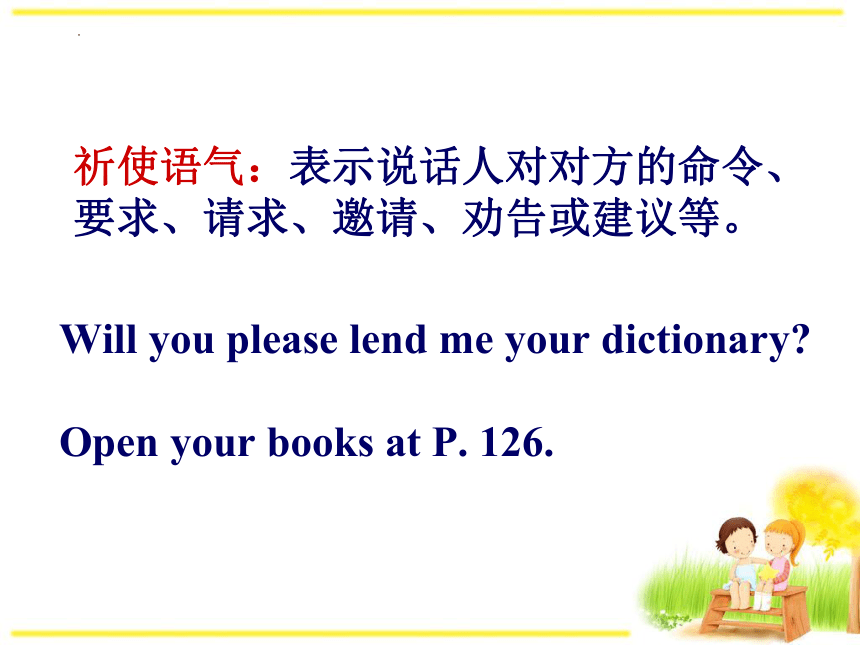
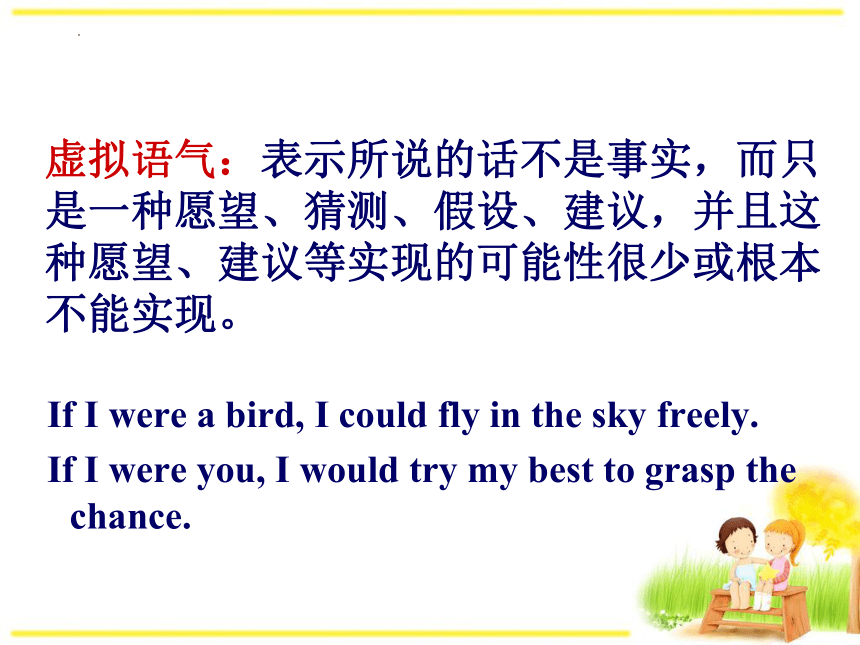
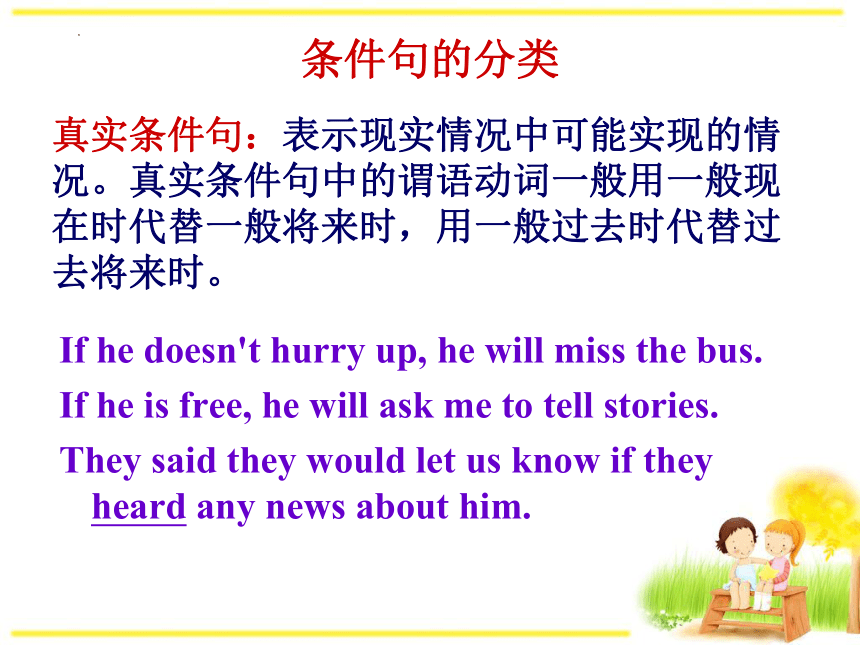
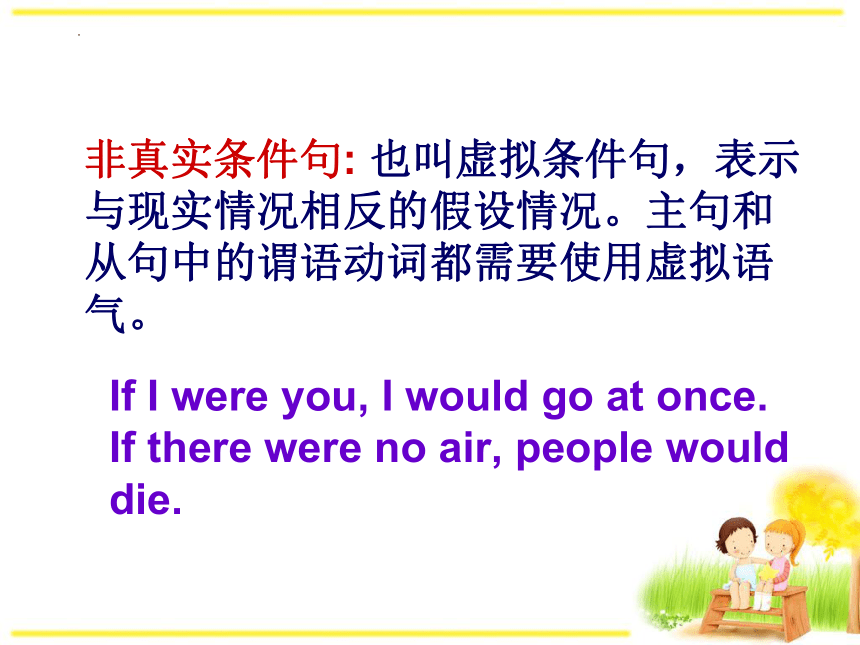
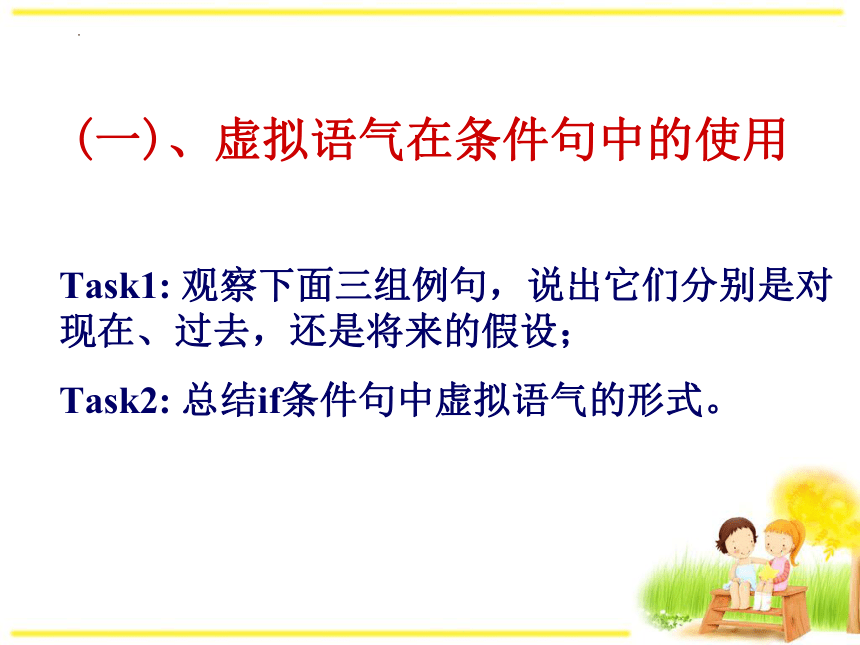
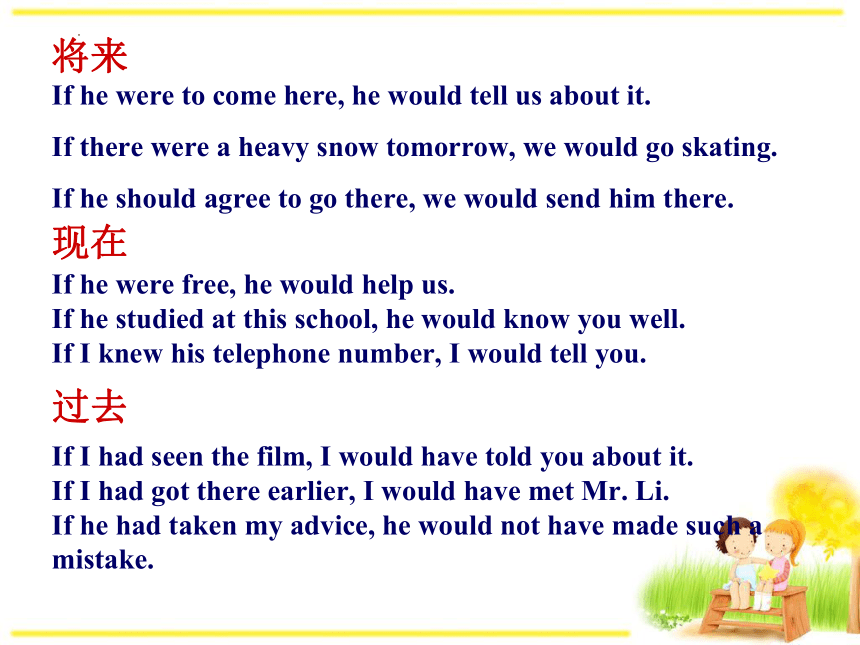
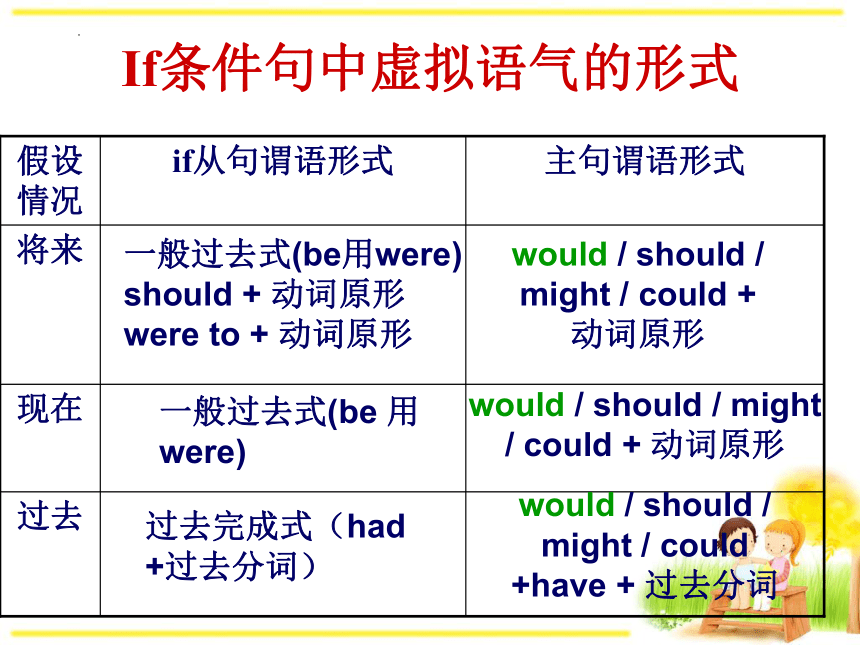
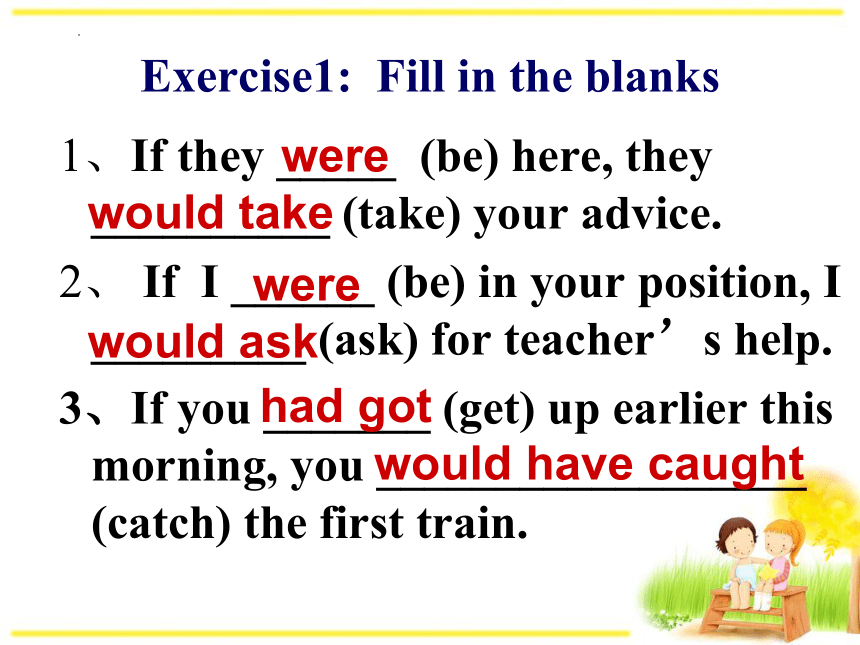
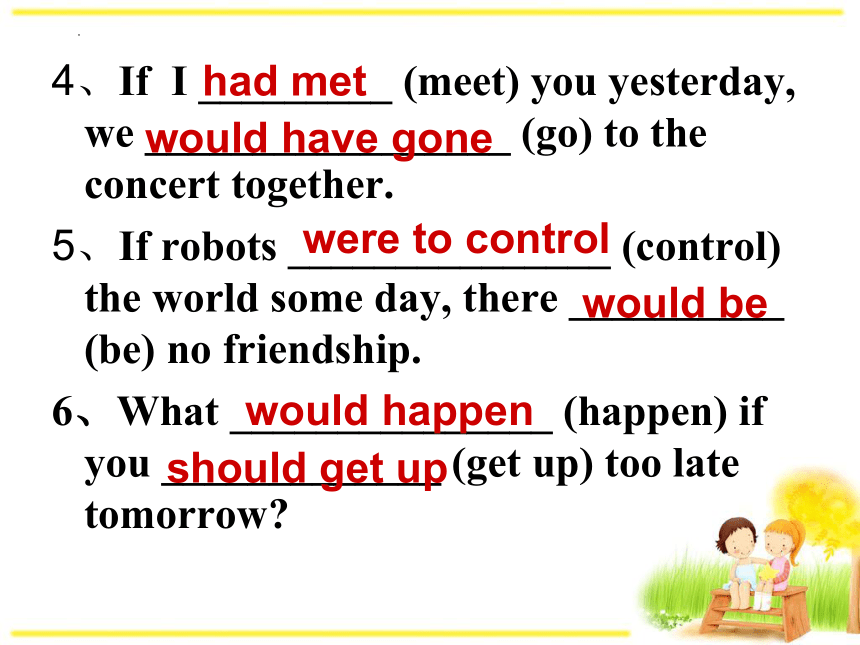
文档简介
(共46张PPT)
Subjunctive Mood
虚拟语气
语气(mood)的定义
语气是动词的一种形式,表示说话人对某一行为或事情的看法或态度。
语气的种类
There are two sides to every question.
I’m a boy of sixteen this year.
陈述语气:表示动作或状态是现实的、确定的或符合事实的,用于陈述句、疑问句和某些感叹句。
祈使语气:表示说话人对对方的命令、要求、请求、邀请、劝告或建议等。
Will you please lend me your dictionary
Open your books at P. 126.
If I were a bird, I could fly in the sky freely.
If I were you, I would try my best to grasp the chance.
虚拟语气:表示所说的话不是事实,而只是一种愿望、猜测、假设、建议,并且这种愿望、建议等实现的可能性很少或根本不能实现。
条件句的分类
If he doesn't hurry up, he will miss the bus.
If he is free, he will ask me to tell stories.
They said they would let us know if they heard any news about him.
真实条件句:表示现实情况中可能实现的情况。真实条件句中的谓语动词一般用一般现在时代替一般将来时,用一般过去时代替过去将来时。
非真实条件句: 也叫虚拟条件句,表示与现实情况相反的假设情况。主句和从句中的谓语动词都需要使用虚拟语气。
If I were you, I would go at once.
If there were no air, people would die.
(一)、虚拟语气在条件句中的使用
Task1: 观察下面三组例句,说出它们分别是对现在、过去,还是将来的假设;
Task2: 总结if条件句中虚拟语气的形式。
If he were to come here, he would tell us about it.
If there were a heavy snow tomorrow, we would go skating.
If he should agree to go there, we would send him there.
If he were free, he would help us.
If he studied at this school, he would know you well.
If I knew his telephone number, I would tell you.
If I had seen the film, I would have told you about it.
If I had got there earlier, I would have met Mr. Li.
If he had taken my advice, he would not have made such a mistake.
将来
现在
过去
If条件句中虚拟语气的形式
假设情况 if从句谓语形式 主句谓语形式
将来
现在
过去
一般过去式(be用were)
should + 动词原形
were to + 动词原形
would / should / might / could + 动词原形
一般过去式(be 用 were)
would / should / might / could + 动词原形
过去完成式(had +过去分词)
would / should / might / could +have + 过去分词
Exercise1: Fill in the blanks
1、If they _____ (be) here, they __________ (take) your advice.
2、 If I ______ (be) in your position, I _________ (ask) for teacher’s help.
3、If you _______ (get) up earlier this morning, you __________________ (catch) the first train.
were
would take
were
would ask
had got
would have caught
4、If I _________ (meet) you yesterday, we _________________ (go) to the concert together.
5、If robots _______________ (control) the world some day, there __________ (be) no friendship.
6、What _______________ (happen) if you _____________ (get up) too late tomorrow
had met
would have gone
were to control
would be
should get up
would happen
Answers for Exercise 2 on page 5
If he had right to choose his holiday, he would go to Mexico.
If I were not allergic to shellfish, I would enjoy eating them.
If the marble statue were not too large for her garden, the housewife would buy it.
If we knew more about the disease, we would be able to treat the patients very effectively.
Exercise 2: Finish the exercise 2 and 3 on page 5.
Answers for Exercise 3 on page 5
David is not a sculptor. If he were, he would make a sculpture for the exhibition.
Sally is not an aggressive woman. If she were, she would be a more successful business woman.
If Sam were here, he would be so excited about meeting a famous scholar in the flesh.
If I could paint, I would paint you an abstract painting in the style of Matisse.
Mr Ling isn’t here. If he were, he would help you with your geometry.
It’s Miss Liang’s birthday today. I wish I could\would take her out to a superb restaurant for dinner.
We don’t know her address. If we knew it, we would send her a large bunch of flowers.
People say that the art exhibition is worth seeing. I wish I could\would go with you but I’m too busy these day.
If Masaccio were alive today, he would be amazed at how artists paint today.
If Peter should come to our school, he could go to art classes.
Homework: Make Sentences
要是我是你,我就会告诉他真相了。(tell sb. the truth)
如果她有足够的钱,她就去买一台电脑。
要是能下雨的话,庄稼就能得救了。(crops, save)
要是明天不考试的话,我就能和你一起去野餐了。(go to picnic)
如果你听了我的建议,你就不会考试不及格。( follow one’s advice)
如果我早点到那儿,我就会见到她了。
If I were you, I would (should, could, might) tell him the truth.
If she had enough money, she would buy a computer.
要是我是你,我就会告诉他真相了。(tell sb. the truth)
2.如果她有足够的钱,她就去买一台电脑。
If it were to rain / rained / should rain, the crops would be saved.
If I shouldn’t take the exam tomorrow, I would go to picnic with you.
3.要是能下雨的话,庄稼就能得救了。(crops, save)
4. 要是明天不考试的话,我就能和你一起去野餐了。(go to picnic)
If you had followed my advice, you wouldn’t have failed in the exam.
If I had got there earlier, I would have met her.
5.如果你听了我的建议,你就不会考试不及格。(take / follow one’s advice)
6.如果我早点到那儿,我就会见到她了。
If you had followed my advice, you would have passed the exam.
虚拟条件句中应注意的问题
If I were ten years younger, I would study abroad. 要是我还年轻十岁的话,我会去国外学习。
If I were you, I would try my best to grasp the chance.
要是我是你的话,我要尽力抓住这次机会。
1. 在虚拟语气的从句中,动词be的过去时态一律用were。
2.当虚拟条件句中的谓语动词含有were, should, had时,if可省略,而将were, should, had置于句首。
Should he agree to go there, we would send him there. 要是他答应去的话,我们就派他去。
Were she here, she would agree with us. 如果她在这儿的话,她会同意我们的。
Had he learnt about computers, we would have hired him to work here. 如果她懂一些电脑知识的话,我们会已经聘用他来这里工作了。
注意: 如果条件句是否定式,倒装时不能用缩写式或把not也放在主语之前。
If I had not got there late, I would have met her.
→Had I not got there late, I would have met her.
→Had not(Hadn’t) I got there late, I would have met her.
3. 有时,虚拟条件句中,主句和条件从句的谓语动作若不是同时发生时,虚拟语气的形式应做相应的调整,这种条件句叫做错综条件句(混合条件句)。
If I had worked hard at school, I would be an engineer now.
If I were you, I would have taken his advice.
(从句说明过去,主句说明现在)
(从句说明现在,主句说明过去)
4. 非真实条件句中的条件从句有时不表达出来,只暗含在连词、副词、介词短语、上下文或其他方式中,这种句子叫做含蓄条件句。多数情况下,多暗含or,otherwise, but for…(要不是因为……), without…
But for his help, we would be working now.
要不是他的帮助,我们还会在工作呢。
Without your instruction, I would not have made such great progress. 要是没有你的指导,我不会取得如此大的进步。
(二)、虚拟语气在其他从句中的使用
He suggested that we (should) take the teacher’s advice.
He insisted that we (should) accept these gifts.
The teacher advised that we (should) make good use of every minute here.
1. 英语中,表示坚持、命令、建议、 要求等意义的动词所接的名词性从句一般用虚拟语气,其虚拟语气的结构为:(should)+ 动词原形。
这样的动词有:
一坚持:insist
二命令:order、command
三建议:advise、suggest、propose
四要求:request、require、demand、
desire
名词形式: order, advice, suggestion,
proposal, demand, desire,
request, requirement
We suggest that you go there by bus.
= Our suggestion is that you go there by bus.
= This is our suggestion that you go there by bus.
= It is suggested that you go there by bus.
His face suggests that he looks worried.
His smile suggested that he had succeeded in this exam.
He suggested that we (should) take the teacher’s advice.
当suggest的意思为“表明、暗示”时,宾语从句一般不用虚拟语气。
试比较:
He insists he is a student.
Tom insisted that he hadn’t stolen the watch.
He insisted that we (should) accept these gifts.
☆ 当insist的意思为“坚持认为、坚持说”的意思时,宾语从句一般不用虚拟语气。
2. 在主语从句中:
It’s necessary/strange/natural/important/
impossible/essential/vital/a pity/a shame/no wonder……+ that Clause 从句中的动词要用虚拟, 即(should)+动词原形
It is strange that____________________.
他居然会这样说,真是奇怪。
It is a great pity that____________________.
他居然会这样想,真是一件憾事。
It is natural that__________________________.
鸟在树上安歇是很自然的。
It is necessary that___________________________.
有必要立即派他去北京。
he ( should ) say so
he ( should ) think so
a bird ( should ) rest in trees
he be sent to Beijing right away
3. 动词wish后的宾语从句, 表示与现在或过去的事实相反,或对将来的主观愿望, 从句通常省略连词that。
将来:I wish I would have a chance again.
He wishes we could go and play games with him.
现在:I wish I had your brains.
I wish I learnt English well.
过去:I wish I had been there with them last week.
I wish I had known the truth.
时间 虚拟语气结构
对将来的愿望 could / would + 动词原形
与现在事实相反 一般过去时 (be用were)
与过去事实相反 过去完成时 (had done)
注意:
wish本身可以是过去式,表示过去的一种愿望,that从句的时态不受影响。
He wished that he hadn’t told her the bad news yesterday.
4.在would rather之后的宾语从句常表示与客观事实不相符的一种愿望,故用虚拟语气。
I’d rather you had seen the film yesterday. 我倒想你昨天看过了这场电影。
I’d rather you were here now.
我倒想你现在在这儿。
We’d rather you went here tomorrow.
我们倒想你明天去那儿。
在would rather后的宾语从句中:
表示对现在或将来情况的虚拟,用一般过去式(be用were)
表示对过去情况的虚拟,用过去完成式(had done)
Make Sentences
他宁愿他努力工作过。
我宁愿他不认识我。
He would rather he had worked hard.
I would rather he didn’t know me.
以as if 、as though(似乎,好像)引导的从句,如果表示真实情况应该用陈述语气;如果表示非真实情况则应该用虚拟语气。即:
表示与现在事实相反,用过去式;
与过去事实相反用过去完成式 (had done);
与将来事实相反,用would / could / might / should+动词原形。
5. as if, as though引导的从句
1. He looked as if he hadn’t slept for two days.
2. It seems as if/though the meeting would never end.
3. She talks as if/though she were an American.
6. It’s (high/about) time that…(该是做……的时候了)
从句要用虚拟语气:谓语用过去时或should + do,should不能省略。
It’s (high/about) time that you left here.
It’s (high/about) time that you should leave here.
7. 由if only (要是……,那该多好啊!)引导的惊叹句。表示现在的情况,应用过去时; 如果是过去的情况,应用过去完成时;如果就将来的情况,应用could/would+动词原形。(同wish)
If only I had passed the test !
If only it stopped raining!
If only I would go to Beijing tomorrow!
only if表示“只有”;if only则表示“如果……就好了”。
I wake up __________the alarm clock rings.
只有闹钟响了,我才会醒。
___________the alarm clock had rung.
要是当时闹钟响了,就好了。
___________he comes early. 但愿他早点回来。
only if
If only
If only
比较only if与if only
8. 情态动词+have+done:
should/ought to+have+done
shouldn’t/ought not to+ have+ done
needn’t+ have+ done
could/may/might+ have+ done
1. I have told you many times. You should have done it better.
2. You oughtn’t to have failed this time.
3. You needn’t have told him. He has already known about it.
4. You are late again. You could have come earlier.
5. You’ve made a few mistakes. You might have been a little more careful.
9. 某些简单句的固定句型:
Heaven help him!
God bless you!
May you succeed!
Long live the People’s Republic of China!
Subjunctive Mood
虚拟语气
语气(mood)的定义
语气是动词的一种形式,表示说话人对某一行为或事情的看法或态度。
语气的种类
There are two sides to every question.
I’m a boy of sixteen this year.
陈述语气:表示动作或状态是现实的、确定的或符合事实的,用于陈述句、疑问句和某些感叹句。
祈使语气:表示说话人对对方的命令、要求、请求、邀请、劝告或建议等。
Will you please lend me your dictionary
Open your books at P. 126.
If I were a bird, I could fly in the sky freely.
If I were you, I would try my best to grasp the chance.
虚拟语气:表示所说的话不是事实,而只是一种愿望、猜测、假设、建议,并且这种愿望、建议等实现的可能性很少或根本不能实现。
条件句的分类
If he doesn't hurry up, he will miss the bus.
If he is free, he will ask me to tell stories.
They said they would let us know if they heard any news about him.
真实条件句:表示现实情况中可能实现的情况。真实条件句中的谓语动词一般用一般现在时代替一般将来时,用一般过去时代替过去将来时。
非真实条件句: 也叫虚拟条件句,表示与现实情况相反的假设情况。主句和从句中的谓语动词都需要使用虚拟语气。
If I were you, I would go at once.
If there were no air, people would die.
(一)、虚拟语气在条件句中的使用
Task1: 观察下面三组例句,说出它们分别是对现在、过去,还是将来的假设;
Task2: 总结if条件句中虚拟语气的形式。
If he were to come here, he would tell us about it.
If there were a heavy snow tomorrow, we would go skating.
If he should agree to go there, we would send him there.
If he were free, he would help us.
If he studied at this school, he would know you well.
If I knew his telephone number, I would tell you.
If I had seen the film, I would have told you about it.
If I had got there earlier, I would have met Mr. Li.
If he had taken my advice, he would not have made such a mistake.
将来
现在
过去
If条件句中虚拟语气的形式
假设情况 if从句谓语形式 主句谓语形式
将来
现在
过去
一般过去式(be用were)
should + 动词原形
were to + 动词原形
would / should / might / could + 动词原形
一般过去式(be 用 were)
would / should / might / could + 动词原形
过去完成式(had +过去分词)
would / should / might / could +have + 过去分词
Exercise1: Fill in the blanks
1、If they _____ (be) here, they __________ (take) your advice.
2、 If I ______ (be) in your position, I _________ (ask) for teacher’s help.
3、If you _______ (get) up earlier this morning, you __________________ (catch) the first train.
were
would take
were
would ask
had got
would have caught
4、If I _________ (meet) you yesterday, we _________________ (go) to the concert together.
5、If robots _______________ (control) the world some day, there __________ (be) no friendship.
6、What _______________ (happen) if you _____________ (get up) too late tomorrow
had met
would have gone
were to control
would be
should get up
would happen
Answers for Exercise 2 on page 5
If he had right to choose his holiday, he would go to Mexico.
If I were not allergic to shellfish, I would enjoy eating them.
If the marble statue were not too large for her garden, the housewife would buy it.
If we knew more about the disease, we would be able to treat the patients very effectively.
Exercise 2: Finish the exercise 2 and 3 on page 5.
Answers for Exercise 3 on page 5
David is not a sculptor. If he were, he would make a sculpture for the exhibition.
Sally is not an aggressive woman. If she were, she would be a more successful business woman.
If Sam were here, he would be so excited about meeting a famous scholar in the flesh.
If I could paint, I would paint you an abstract painting in the style of Matisse.
Mr Ling isn’t here. If he were, he would help you with your geometry.
It’s Miss Liang’s birthday today. I wish I could\would take her out to a superb restaurant for dinner.
We don’t know her address. If we knew it, we would send her a large bunch of flowers.
People say that the art exhibition is worth seeing. I wish I could\would go with you but I’m too busy these day.
If Masaccio were alive today, he would be amazed at how artists paint today.
If Peter should come to our school, he could go to art classes.
Homework: Make Sentences
要是我是你,我就会告诉他真相了。(tell sb. the truth)
如果她有足够的钱,她就去买一台电脑。
要是能下雨的话,庄稼就能得救了。(crops, save)
要是明天不考试的话,我就能和你一起去野餐了。(go to picnic)
如果你听了我的建议,你就不会考试不及格。( follow one’s advice)
如果我早点到那儿,我就会见到她了。
If I were you, I would (should, could, might) tell him the truth.
If she had enough money, she would buy a computer.
要是我是你,我就会告诉他真相了。(tell sb. the truth)
2.如果她有足够的钱,她就去买一台电脑。
If it were to rain / rained / should rain, the crops would be saved.
If I shouldn’t take the exam tomorrow, I would go to picnic with you.
3.要是能下雨的话,庄稼就能得救了。(crops, save)
4. 要是明天不考试的话,我就能和你一起去野餐了。(go to picnic)
If you had followed my advice, you wouldn’t have failed in the exam.
If I had got there earlier, I would have met her.
5.如果你听了我的建议,你就不会考试不及格。(take / follow one’s advice)
6.如果我早点到那儿,我就会见到她了。
If you had followed my advice, you would have passed the exam.
虚拟条件句中应注意的问题
If I were ten years younger, I would study abroad. 要是我还年轻十岁的话,我会去国外学习。
If I were you, I would try my best to grasp the chance.
要是我是你的话,我要尽力抓住这次机会。
1. 在虚拟语气的从句中,动词be的过去时态一律用were。
2.当虚拟条件句中的谓语动词含有were, should, had时,if可省略,而将were, should, had置于句首。
Should he agree to go there, we would send him there. 要是他答应去的话,我们就派他去。
Were she here, she would agree with us. 如果她在这儿的话,她会同意我们的。
Had he learnt about computers, we would have hired him to work here. 如果她懂一些电脑知识的话,我们会已经聘用他来这里工作了。
注意: 如果条件句是否定式,倒装时不能用缩写式或把not也放在主语之前。
If I had not got there late, I would have met her.
→Had I not got there late, I would have met her.
→Had not(Hadn’t) I got there late, I would have met her.
3. 有时,虚拟条件句中,主句和条件从句的谓语动作若不是同时发生时,虚拟语气的形式应做相应的调整,这种条件句叫做错综条件句(混合条件句)。
If I had worked hard at school, I would be an engineer now.
If I were you, I would have taken his advice.
(从句说明过去,主句说明现在)
(从句说明现在,主句说明过去)
4. 非真实条件句中的条件从句有时不表达出来,只暗含在连词、副词、介词短语、上下文或其他方式中,这种句子叫做含蓄条件句。多数情况下,多暗含or,otherwise, but for…(要不是因为……), without…
But for his help, we would be working now.
要不是他的帮助,我们还会在工作呢。
Without your instruction, I would not have made such great progress. 要是没有你的指导,我不会取得如此大的进步。
(二)、虚拟语气在其他从句中的使用
He suggested that we (should) take the teacher’s advice.
He insisted that we (should) accept these gifts.
The teacher advised that we (should) make good use of every minute here.
1. 英语中,表示坚持、命令、建议、 要求等意义的动词所接的名词性从句一般用虚拟语气,其虚拟语气的结构为:(should)+ 动词原形。
这样的动词有:
一坚持:insist
二命令:order、command
三建议:advise、suggest、propose
四要求:request、require、demand、
desire
名词形式: order, advice, suggestion,
proposal, demand, desire,
request, requirement
We suggest that you go there by bus.
= Our suggestion is that you go there by bus.
= This is our suggestion that you go there by bus.
= It is suggested that you go there by bus.
His face suggests that he looks worried.
His smile suggested that he had succeeded in this exam.
He suggested that we (should) take the teacher’s advice.
当suggest的意思为“表明、暗示”时,宾语从句一般不用虚拟语气。
试比较:
He insists he is a student.
Tom insisted that he hadn’t stolen the watch.
He insisted that we (should) accept these gifts.
☆ 当insist的意思为“坚持认为、坚持说”的意思时,宾语从句一般不用虚拟语气。
2. 在主语从句中:
It’s necessary/strange/natural/important/
impossible/essential/vital/a pity/a shame/no wonder……+ that Clause 从句中的动词要用虚拟, 即(should)+动词原形
It is strange that____________________.
他居然会这样说,真是奇怪。
It is a great pity that____________________.
他居然会这样想,真是一件憾事。
It is natural that__________________________.
鸟在树上安歇是很自然的。
It is necessary that___________________________.
有必要立即派他去北京。
he ( should ) say so
he ( should ) think so
a bird ( should ) rest in trees
he be sent to Beijing right away
3. 动词wish后的宾语从句, 表示与现在或过去的事实相反,或对将来的主观愿望, 从句通常省略连词that。
将来:I wish I would have a chance again.
He wishes we could go and play games with him.
现在:I wish I had your brains.
I wish I learnt English well.
过去:I wish I had been there with them last week.
I wish I had known the truth.
时间 虚拟语气结构
对将来的愿望 could / would + 动词原形
与现在事实相反 一般过去时 (be用were)
与过去事实相反 过去完成时 (had done)
注意:
wish本身可以是过去式,表示过去的一种愿望,that从句的时态不受影响。
He wished that he hadn’t told her the bad news yesterday.
4.在would rather之后的宾语从句常表示与客观事实不相符的一种愿望,故用虚拟语气。
I’d rather you had seen the film yesterday. 我倒想你昨天看过了这场电影。
I’d rather you were here now.
我倒想你现在在这儿。
We’d rather you went here tomorrow.
我们倒想你明天去那儿。
在would rather后的宾语从句中:
表示对现在或将来情况的虚拟,用一般过去式(be用were)
表示对过去情况的虚拟,用过去完成式(had done)
Make Sentences
他宁愿他努力工作过。
我宁愿他不认识我。
He would rather he had worked hard.
I would rather he didn’t know me.
以as if 、as though(似乎,好像)引导的从句,如果表示真实情况应该用陈述语气;如果表示非真实情况则应该用虚拟语气。即:
表示与现在事实相反,用过去式;
与过去事实相反用过去完成式 (had done);
与将来事实相反,用would / could / might / should+动词原形。
5. as if, as though引导的从句
1. He looked as if he hadn’t slept for two days.
2. It seems as if/though the meeting would never end.
3. She talks as if/though she were an American.
6. It’s (high/about) time that…(该是做……的时候了)
从句要用虚拟语气:谓语用过去时或should + do,should不能省略。
It’s (high/about) time that you left here.
It’s (high/about) time that you should leave here.
7. 由if only (要是……,那该多好啊!)引导的惊叹句。表示现在的情况,应用过去时; 如果是过去的情况,应用过去完成时;如果就将来的情况,应用could/would+动词原形。(同wish)
If only I had passed the test !
If only it stopped raining!
If only I would go to Beijing tomorrow!
only if表示“只有”;if only则表示“如果……就好了”。
I wake up __________the alarm clock rings.
只有闹钟响了,我才会醒。
___________the alarm clock had rung.
要是当时闹钟响了,就好了。
___________he comes early. 但愿他早点回来。
only if
If only
If only
比较only if与if only
8. 情态动词+have+done:
should/ought to+have+done
shouldn’t/ought not to+ have+ done
needn’t+ have+ done
could/may/might+ have+ done
1. I have told you many times. You should have done it better.
2. You oughtn’t to have failed this time.
3. You needn’t have told him. He has already known about it.
4. You are late again. You could have come earlier.
5. You’ve made a few mistakes. You might have been a little more careful.
9. 某些简单句的固定句型:
Heaven help him!
God bless you!
May you succeed!
Long live the People’s Republic of China!
